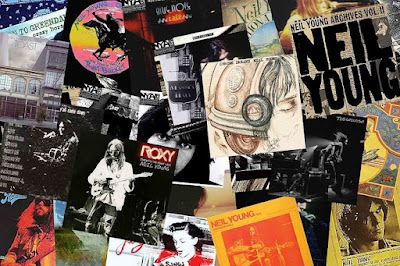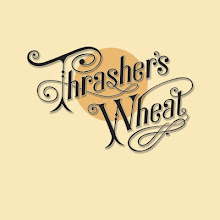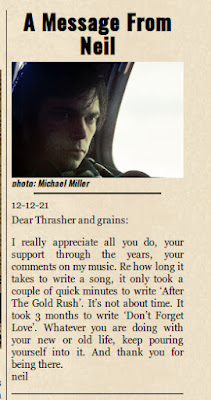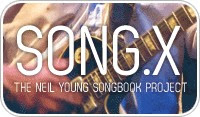Neil Young Empties the Vaults: The Bootleggers Were Right | Paste
As usual, much speculation about the future of Neil Young's Archives project.
Of course, there is the "Informed Speculation" on Neil Young's next Archives release of Volume #3, presumably coming sometime here in 2024. And then there is the recent "Very Informed Speculation" on what will be in Archives Volume #4.
All of which brings us to the article "The Curmudgeon: Neil Young Empties the Vaults" | Paste by Geoffrey Himes:
There’s a reason Columbia/Legacy Records has given its reissues of Bob Dylan and Miles Davis the umbrella title of The Bootleg Series.
It’s a back-handed acknowledgement, decades after the original debates, that the bootleggers may have been right. When rock’n’roll bootlegs became widespread in the 1970s, their advocates were arguing, “Yeah, sure, they’re illegal, but if the record companies and their artists refuse to release some of the best music of our time, unlawful work-arounds are justified. If fans can’t legally obtain Dylan’s 1966 “Judas” concert or his “Basement Tapes” with the Band, then listeners deserve to find them on the black market.”
When Columbia finally released those recordings decades later, it confirmed that, yes, these were cultural highlights of their era that should not have been withheld. Instead of trying to create an artificial scarcity of product, the industry should have released more music while these artists were at the peak of their powers. (Bootlegs should not be confused with “pirates,” exact copies of legally available recordings—there’s no justification for that.) In recent years, the labels have seen the error of their ways and have emptied the vaults of not just Dylan but also such much-bootlegged artists such as the Grateful Dead, Joni Mitchell, Prince, Bruce Springsteen and Van Morrison. This music from these artists’ prime often eclipses the quality of their later work, and most fans prefer the best stuff to the latest.
Over the past five years, few artists have been as active as Neil Young in filling in the gaps of his discography.
Full article @ "The Curmudgeon: Neil Young Empties the Vaults" | Paste by Geoffrey Himes.
So back to the "the bootleggers may have been right" quote. Let's remove any doubt right here and now: The Bootleggers Were Right.
The excellent linked article @ Paste makes the entire case in and of itself.
Or -- in other words -- the record labels were clearly wrong. And if it had not been for those enterprising bootleggers, some of the best of live concert performances would have never been heard except by those lucky enough to be in the audience.
Fortunately for Neil Young fans, his music has long been near the top of the bootleggers artist lists.
More on Neil Young's Official Bootleg Series.
Labels: archives, bootleg, neil young, neil young archives, nya



































 Human Highway
Human Highway

















 Concert Review of the Moment
Concert Review of the Moment





 This Land is My Land
This Land is My Land

 FREEDOM In A New Year
FREEDOM In A New Year









 *Thanks Neil!*
*Thanks Neil!*




![[EFC Blue Ribbon - Free Speech Online]](http://www.thrasherswheat.org/gifs/free-speech.gif)











 The Unbearable Lightness of Being Neil Young
The Unbearable Lightness of Being Neil Young Pardon My Heart
Pardon My Heart



 "We're The Ones
"We're The Ones  Thanks for Supporting Thrasher's Wheat!
Thanks for Supporting Thrasher's Wheat!




 This blog
This blog 
 (... he didn't kill himself either...)
#AaronDidntKillHimself
(... he didn't kill himself either...)
#AaronDidntKillHimself









































































 Neil Young's Moon Songs
Neil Young's Moon Songs




 Civic Duty Is Not Terrorism
Civic Duty Is Not Terrorism Orwell (and Grandpa) Was Right
Orwell (and Grandpa) Was Right


 What's So Funny About
What's So Funny About 



6 Comments:
“the bootleggers may have been right” – Yes indeed but like most things the subject I believe is a little more nuanced. To me there are two distinct and separate forms of bootleg – one is a live recording (audience or soundboard) vs outtake, alternate versions or in Niel’s case, lost albums.
The issue of copyright hangs over all of this like a dark shadow but to simplify it (if you would indulge me) it can be argued recordings of live performance may or may not fall under the artist copyright but the fact that a paying punter has “paid” to see and listen the performance makes the issue of copyright complicated. If you are interested in learning more on the legal aspect Clinton Heylin book “Bootleg – the secret history of the other recording industry” is a good read.
I am not a lawyer so will leave that matter to them but getting back to live performances they have great value to me as a fan since most of us are unable to attend every Neil show for various reasons and in Neil’s case, they provide ways to hear unreleased songs in a delivery approved by the artists since they are performing them. This was especially true back in the 70’s.
Another reason “the bootleggers may have been right” they provide better versions of songs than their studio album counterparts a good example of this would be the album “Life” vs the Trade Mark of Quality boot “Damage Done” from the 1986 Crazy Horse tour. To me the boot is a more enjoyable listen.
However, now we start to get into the area of artistic vision and creativity, and it should be stated in my view Neil’s artistic vision trumps all rights and we must respect his choice to issue Life vs a live concert recording of the tour. Does this make the bootleggers wrong? Not necessarily in my view. But it does raise the question that if Neil chooses not to release something which is his artistic and creativeright, we should respect that artistic decision. The fact as fans we may be interested to hear those outtakes and lost albums does not give license to bootleggers to release them. So, I can see the argument here that the bootleggers were wrong.
As fans of Mr. Young, we are interested in all things Neil, albums, concerts, outtakes and lost albums to help us understand and appreciate Neil’s as an artist more fully. So back before NYA and Sir Bob’s bootleg series and Bruce Springsteen live series the bootleggers were simply meeting market demand.
Were they right? I am not so sure it even matters as folks like me, and I suspect some of you go to Neil’s shows (at least before thicket prices reached ridiculous prices, but that is another story) buy all his albums, box sets etc. so the argument that bootlegs take away artistic sales is mute IMHO.
So maybe it is not the bootleggers were right as so much the record companies and artists were a little slow on the uptake?
Kevin D. in Morro Bay
NOT SHOUTING> VISION IMPAIRED.
HI. FIRST POST WAS REJECTED A PREC`IS FOLLOWS,RE YOUR COMMENTS AFTER THE MAIN ARTICLE I MUST POINT OUT SEVERAL INACCURACIES AND MISTAKEN ATTRIBUTIONS THAT "THE RECORD COMPANIES WERE WRONG".
THE ARTICLE CORRECTLY, CONFIRMS THE REASON OF NON RELEASE OF THE MATERIAL AS ENTIRELY THE DECEISION OF NY HIMSELF, NOTHING TO DO WITH THE "COMPANY".
RE BOOTLEGS,YOU INCORECTLY SEPERATE THEM FROM COUNTERFEITS, HOWEVER THEY ARE ALL ILLEGAL FOR THE SAME REASON, BREACH OF COPYRIGHT OF ARTISTS, RECORD CO,S MUSIC PUBLISHERS WHO HAVE CONTRACTED THE RIGHTS FROM THE ORIGINATOR.
DYLANS BOOTLEG RELEASE "GREAT WHITE WONDER" WAS MAINLY NON COPYRIGHTED MATERIAL BEFORE HE SIGNED WITH CBS/WITMARK, HOWEVER THE PEOPLE BEHIND IT WERE NOT ISSUING IT AS A SOCIAL SERVICE BUT TO MAKE MONEY FOR THEMSELVES!
IN ENGLAND, AN LP COST £1.60P APPROX $2.75C, G W W SOLD FOR £5. $7.50C. ONLY THE BOOTLEGGERS/SHOPS ETC POCKETED THAT MONEY!.
THE VAST MAJORITY OF "LIVE " BOOTLEGS OF COPYRIGHTED MUSIC ARE ALSO ILLEGAL, MADE TO FINANCIALLY BENEFIT THE BOOTLEGGERS NOT THE ARTIST, RECORD CO, PUBLISHERS HAVE NO CONTROL WHATSOVER OVER SAME.
CBS INITIALLY LET HIM (NOT IN HIS CONTRACT) CHOOSE ALBUM TRACKS, RESULTING IN THE INFAMOUS WITHDRAWEL AFTER RELEASE OF "FREEWHEELIN" TO SUBSTITUTE "TALKIN JOHN BIRCH BLUES"
DYLAN FANS WILL AGREE CHOICE OF SONGS WAS OFTEN WILFULLY ECCENTRIC,TO NOT RELEASE I,LL KEEP IT WITH MINE, LAY DOWN YOUR WEARY TUNE,ETC FOR EXAMPLE WAS CRIMINAL, BUT IT WAS HIS DECEISION, NOT CBS.
RE THE "BASEMENT TAPES" AS AN EXAMPLE OF RECORD CO FAILURE!, THEY WERE RECORDED AT "BIG PINK" TOTALLY OUTSDE OF THE KNOWLEDGE OF CBS, WERE REHERSALS, NEVER INTENDED FOR RELEASE,IN SUBSEQUENT BIOS IT,S BEEN CONFIRMED THAT DYLAN WAS AT THE SAME TIME SENDING CBS DR,S NOTES TO CONFIRM HIS INABILITY, DUE TO ILLNESS, TO PROVIDE A CONTRACTUAL ALBUM!.
HE THEN WROTE/RECORDED ONE OF HIS GREATEST ALBUMS"JOHN WESLEY HARDING" FOR RELEASE!.
IF THE TAPES HAD BEEN ERASED/OVERRECORDED, AND DUPLICATES NOT GIVEN TO HIS MUSIC PUBLISHERS, TO ESTABLISH COPYRIGHT, THEN THEY WOULD HAVE REMAINED UNKNOWN, AND CBS HAD TO PAY DYLAN/BAND BOTH CONTRACTED, FOR THE RIGHT TO RELEASE A SMALL PORTION, YET AGAIN THE COMPANY HAD NO CONTROL OR RIGHT WHATSOVER TO RELEASE THOSE PERFORMANCES UNTIL THEY HAD OBTAINED THE ARTISTS CONSENT.
I HAVE NOTED THE PHOTOS OF A SMALL SECTION OF NY'S ARCHIVE, HUNDREDS OF TAPES ON THE SHELVES, IT,S CLEAR HE HAS RECORDED THE VAST MAJORITY, IF NOT ALL, HIS CONCERTS SO THERE ARE PROBABLY THOUSANDS OF CONCERTS, POSSIBLE RECORDINGS, HE COULD RELEASE BUT HAS CHOSEN NOT TO DO SO, AGAIN HIS DECEISION, NOT REPRISE/WB.
THE FACT THAT W B ARE NOW CO-OPERATING TO RELEASE A PLETHORA OF MUSIC RELEASES IS SOMETHING THEY SHOULD BE COMMENDED FOR, NOT CRITICISED, REMEMBER PRINCE!
A GENERAL COMMENT, MOST ARTIST RETAIN THE RIGHT TO CONTROL THE RELEASE OF THEIR MUSIC, THIS THEREFORE DOES NOT GIVE ANYONE ELSE THE "RIGHT" TO RELEASE THAT ARTISTS COPYRIGHTED MATERIAL, I E BOOKS, MUSIC,PHOTOS,PRINTS ETC.
"ENTERPRISING BOOTLEGGERS" IS AN UNFORTUNATE AND MISLEADING COMMENT.
THE COPYING AND SALE, SOLEY FOR THEIR OWN FINANCIAL GAIN, OF SOMEONE ELSE,S WORK WITHOUT ACKNOWLEDGEMENT AND THE APPROPRIATE FINANCIAL PAYMENT FOR SAME IS WRONG, JUST AS IT WOULD IF SOMEONE COPIED YOUR BLOG AND PUT IT UP ON ANOTHER SITE AND OBTAINED AD REVENUE FROM IT.
IT COMES DOWN TO THE ECONOMIC PRINCIPLE THAT THE ARTIST, WHATEVER FORMAT, RELIES ON REVENUE DERIVED FROM THE COPYRIGHT TO FUND THEMSELVES AND TO ENABLE THEM TO CONTINUE TO CARRY ON THEIR WORK, IF NO ONE PAYS FOR CONTENT THE ARTIST WILL NOT BE ABLE TO SUPPORT THEMSELVES TO PRODUCE FUTHER WORK.
SORRY LENGTH OF POST BUT FEEL YOU SHOULD RECONSIDER YOU COMMENTS, INCORRECTLY BLAMING RECORD COMPANIES FOR RELEASES OF MATERIAL, SOLEY CONTROLLED BY THEIR ARTISTS, AND ENDORSING THE ILLEGAL PRACTICE OF BREACH OF COPTRIGHT.
I AM NOT A CONTENT PROVIDER.
ALL THE BEST. MEL.
The stuff Neil didn't release between 1963 and 1976 is certainly of the same quality as what he did; I already like those periods of his career anyway. As we move into the '80s, I wonder if I'll feel the same way and hear some of those lesser albums (to me) in new context.
Bootleg or pirate releases are illegal due to copyright infringement, due to the fact that the money generated by those sales never makes it back to the artist (or the record company. These same recordings are revered by those fans who want everything they can get their hands on. So from this perspective, they are both right and wrong. The artist has the right to release whatever they see fit, and the bootleggers have the freedom (understanding the legal risks) to provide the fans with unreleased material. The artists and their record companies are wrong for not seeing the opportunity to garner more income by holding back certain material. And the bootleggers are wrong for ripping off the artists.
It’s the same with illegal drugs. There is a demand for those drugs, so the drug dealers are right to take advantage by feeding the demand. The government is wrong by making the drugs illegal, because they could be making huge amounts of money by selling them themselves. But the drug dealers are wrong because they are destroying lives by making the drugs available so people can self medicate. And the government is right for attempting to control the reckless use of unsupervised drug medication.
The world is a complicated mess when it comes to right and wrong.
Peace 🙏
Also, the article states that "Sugar Mountain" "was slated for the Hitchhiker album that never got released." I've never heard this before; is that true?
It's usually not wise to talk about right and wrong in broad strokes. I do think there's an ethical difference between keeping a recording for personal use, or circulating it free of charge, and selling it. The point when money changes hands is significant. In the case of a concert recording, one would think the people who did the work of putting on a show have the right to a share in any profits deriving from their labors.
The right to make money in exchange for labor is not purely a social contract. Since everyone needs money to live (which is rarely given away), it's essential to our economic system (such as it is). We benefit from each other's labor because, basically, that's how community works: our survival needs mean there's a lot to do, and one person can't do it all. The person making money directly as a result of your labor, however, is you. Theoretically--it gets complicated when everyone along the production line is supposed to receive an equitable share of monies generated from a group endeavor.
The point remains that an artist has a primary right to make money from their work, unless they waive that right. That's an underlying issue with selling bootlegs. We may not always think of musicians and "entertainers" as doing labor (i.e. working), but they are. There are other important aspects of intellectual property, but the law is generally more interested in the money system than matters of artistic vision!
(Note that I haven't said much about the ethics of the economic system in itself; that would need another post.)
Post a Comment
<< Home